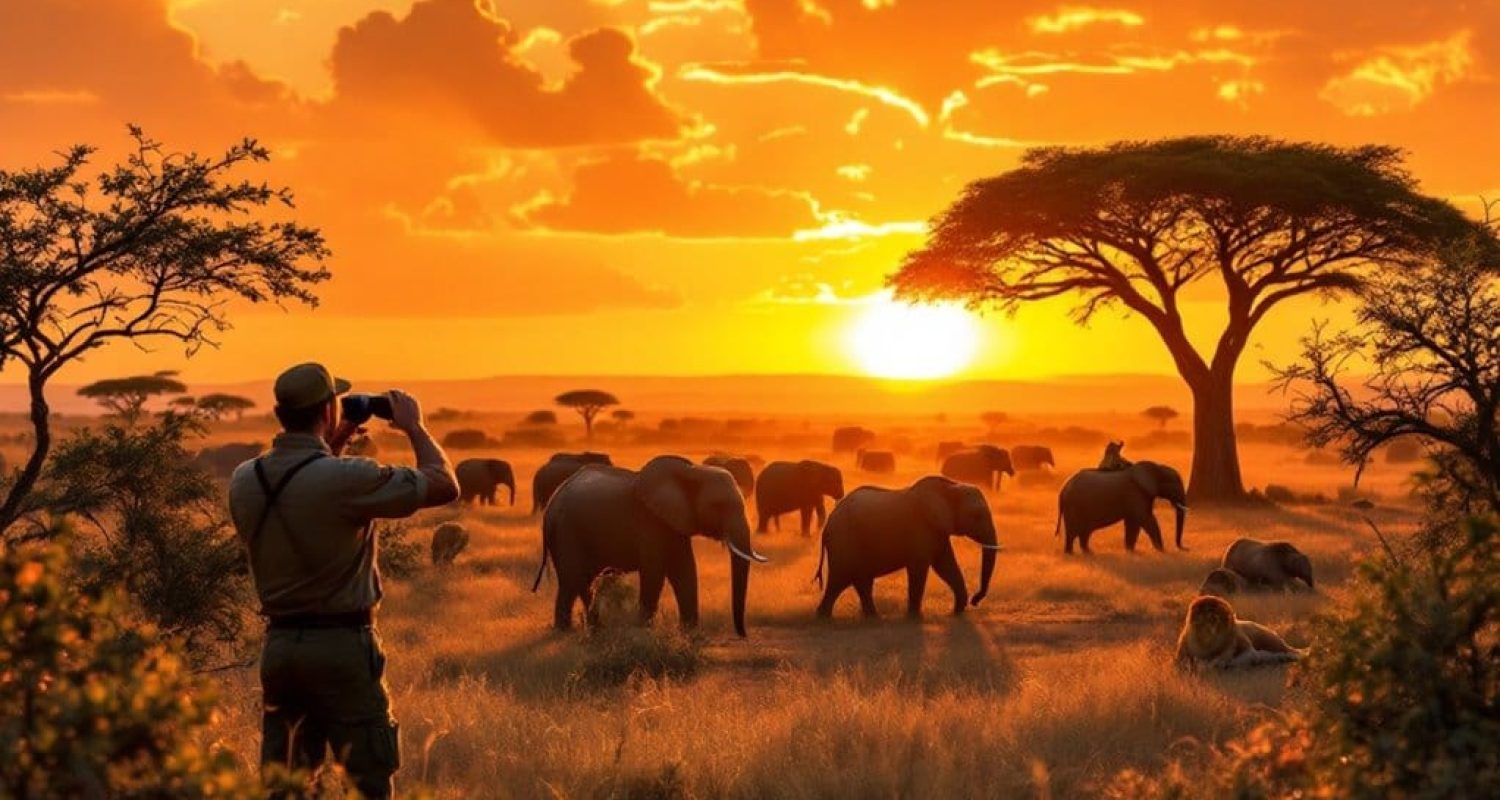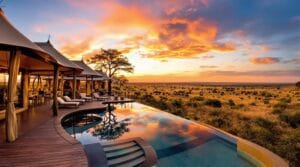Did you know that the establishment of national parks in Africa was a direct response to the alarming decline in wildlife populations due to overhunting and habitat destruction? As you explore the evolution of wildlife conservation in these safari parks, you'll uncover how strategies have shifted from mere preservation of iconic species to integrating local communities and eco-tourism. This transformation raises essential questions about the ethical implications and current challenges faced by these crucial ecosystems. What does this mean for the future of wildlife conservation in Africa?
Key Takeaways
- The establishment of over 300 national parks in the early 20th century marked a significant step in wildlife conservation efforts in Africa.
- Eco-tourism emerged in the late 20th century, shifting focus from trophy hunting to wildlife observation and local economic benefits.
- Community-based conservation initiatives engage local populations in wildlife management, promoting sustainable practices and partnerships.
- Anti-poaching measures have become essential for protecting endangered species, addressing the severe threats posed by poaching.
- Technological advancements and collaborative efforts between governments and NGOs enhance conservation strategies in African safari parks.
Evolution of Wildlife Conservation
Wildlife conservation in Africa has undergone a remarkable evolution, particularly since the early 20th century when over 300 national parks were established to combat the alarming decline of wildlife due to trophy hunting and habitat loss. This transformation reflects a growing commitment to wildlife protection and the preservation of biodiversity.
As eco-tourism emerged in the latter half of the 20th century, the focus shifted from hunting-focused safaris to wildlife observation and conservation efforts. You can see how this change fosters a deeper connection between people and nature, creating a shared responsibility for protecting these magnificent creatures.
Community-based conservation initiatives have gained traction, empowering local communities while promoting partnerships between governments, NGOs, and the private sector.
With the establishment of anti-poaching initiatives and wildlife reserves, the fight against wildlife decline has intensified. Organizations like the African Wildlife Foundation (AWF) have been pivotal in innovating conservation strategies and engaging communities in wildlife protection efforts.
Impact of Colonialism on Conservation
The legacy of colonialism casts a long shadow over conservation efforts in Africa, shaping both the perception and treatment of wildlife and local communities. European colonialism didn't just introduce hunting safaris; it transformed wildlife into trophies for the elite, creating a disconnect between local people and their natural heritage.
The establishment of game reserves often displaced Indigenous communities, stripping them of their ancestral lands and access to crucial resources. This exclusion fostered resentment and further alienated those who'd coexisted with wildlife for generations.
While post-colonial nations recognized the need for conservation, often viewing wildlife as fundamental for tourism, many practices still reflect colonial attitudes. Local communities frequently find themselves sidelined in decision-making processes, despite their intimate knowledge of the land and its creatures.
You can see the irony here: those who once thrived alongside wildlife are now marginalized in discussions about its future.
To truly honor conservation, we must advocate for inclusive practices that empower local voices. By acknowledging the impact of colonialism and working for a collaborative approach, you can help forge a path toward a more equitable and effective conservation landscape in Africa.
Key Conservation Strategies in Safari Parks
Recognizing the historical complexities of conservation in Africa opens the door to understanding the innovative strategies currently shaping safari parks. One of the most empowering approaches is community-based conservation projects. By actively involving local communities in wildlife management, these initiatives not only provide economic benefits but also foster a deeper commitment to conservation efforts.
Anti-poaching initiatives play a critical role in safeguarding endangered species. Collaborations between governments, NGOs, and the private sector work tirelessly to combat poaching and protect crucial habitats. Together, they create a united front against the threats facing wildlife.
Eco-tourism practices also stand out as a transformative strategy. By reinvesting tourism revenues into wildlife protection and local development, these practices guarantee that the economic benefits of safari tourism, which generates approximately $12.4 billion annually, contribute directly to conservation.
Lastly, the establishment of national parks and wildlife reserves, with over 300 created since the early 20th century, is fundamental for protecting declining wildlife populations. Through education and awareness campaigns, safari parks encourage coexistence between humans and wildlife, highlighting the importance of preserving biodiversity for future generations.
Together, these strategies create a brighter future for Africa's incredible wildlife.
Ethical Considerations in Wildlife Management
When you consider wildlife management in African safari parks, the canned hunting controversy can't be ignored.
This practice raises serious ethical questions about animal welfare and the true intentions behind conservation efforts.
Canned Hunting Controversy
Canned hunting raises serious ethical questions about how we manage and perceive wildlife. This practice, where animals are often raised in captivity and have little chance of escape, fundamentally contradicts the principles of ethical hunting practices.
Imagine targeting young, rare, or genetically manipulated animals—it's not just unethical; it undermines genuine conservation efforts. By employing tactics like baiting and spotlighting, canned hunting reduces wildlife to mere commodities, fostering a mentality that views them as trophies instead of essential ecosystem members.
You deserve to be part of a movement that values true wildlife conservation. When we allow canned hunting to persist, we detract from authentic conservation initiatives that aim for sustainability and respect for all creatures.
It's time to advocate for stricter regulations and bans on this practice, promoting a culture of respect and responsibility towards wildlife.
Join your fellow conservationists in rejecting canned hunting. Together, we can push for ethical hunting practices that protect our planet's precious animals and their habitats.
Stand up for wildlife and help guarantee that our conservation efforts reflect the deep respect these magnificent creatures deserve.
Community-Based Conservation Efforts
Community-based conservation (CBC) efforts are revolutionizing how we approach wildlife management, with remarkable success stories emerging across Africa. By empowering local communities to participate in wildlife protection, CBC initiatives guarantee that you're not just a spectator but a crucial part of the solution.
Imagine the pride you'll feel knowing that your support helps reduce poaching rates, as seen in Zambia, where financial incentives through sustainable tourism have transformed local attitudes towards wildlife.
When communities engage in local development through ecotourism or hunting concessions, they start to see the tangible benefits of protecting their natural heritage. Education and awareness programs further enhance this commitment, fostering a sense of stewardship that resonates deeply within the community.
Partnerships among local people, NGOs, and government bodies are essential, blending traditional knowledge with modern conservation practices. This inclusive approach respects Indigenous rights and integrates local customs, guaranteeing that conservation efforts are ethical and culturally relevant.
Community Engagement in Conservation Efforts
You can't underestimate the power of local partnerships in conservation—when communities are directly involved, they're more invested in protecting wildlife.
Economic incentives, like revenue from tourism, not only support families but also promote traditional practices that enhance sustainability.
Local Partnerships in Conservation
Local partnerships in conservation are essential for the sustainable protection of Africa's rich wildlife. By engaging local communities in community-based conservation projects, you empower them to take ownership of their natural resources. This approach not only fosters a sense of belonging but also guarantees that the economic benefits from wildlife tourism are shared.
When communities see a direct financial incentive, they're more likely to participate in conservation efforts. For instance, initiatives like the Easements for Education Program in the Samburu Heartland demonstrate how education can promote conservation awareness, creating a ripple effect of local engagement.
Conservancies established near national parks, such as Lake Mburo and Murchison Falls, further solidify this connection by giving communities a stake in land management and wildlife protection.
Moreover, partnerships among governmental bodies, NGOs, and local communities enable collaborative management of wildlife and habitats, leading to more effective conservation outcomes.
When you support these local partnerships, you're not just helping to protect Africa's wildlife; you're fostering a vibrant community that thrives alongside nature. Together, we can guarantee that future generations inherit a rich and diverse natural heritage.
Economic Incentives for Communities
Building on the foundation of local partnerships, economic incentives play a pivotal role in engaging communities in conservation efforts. By offering tangible benefits, these incentives encourage locals to embrace community-based conservation, fostering a sense of ownership over wildlife protection.
| Economic Incentive | Purpose |
|---|---|
| Livestock for Livelihoods | Supports pastoral resilience |
| Eco-lodges | Creates jobs and boosts local economies |
| Easements for Education | Links wildlife protection to education |
| Tourism revenue | Reinvests in community initiatives |
| Collaborative partnerships | Guarantees successful conservation outcomes |
Programs like Zambia's initiative and eco-lodges like Satao Elerai Camp in Kenya show how the tourism industry can directly benefit local communities. By reinvesting tourism dollars, these efforts create jobs and promote wildlife protection. Initiatives like the Easements for Education Program in the Samburu Heartland enhance community commitment by connecting conservation with educational opportunities for children.
Together, these economic incentives not only help local communities thrive but also forge a powerful bond between people and nature. When you engage in conservation, you're not just protecting wildlife—you're nurturing a sustainable future for your community.
Traditional Practices and Sustainability
Embracing traditional practices can greatly enhance sustainability in conservation efforts across Africa. When communities actively engage in wildlife protection, they foster a sense of ownership and responsibility that benefits both the environment and local economies.
Community-based conservation initiatives are essential, as they provide economic incentives that encourage sustainable practices while reducing poaching.
Consider these impactful approaches:
- Education Programs: Initiatives like the Easements for Education Program in the Samburu Heartland cultivate a future generation that values wildlife conservation.
- Sustainable Livelihoods: The Livestock for Livelihoods Program promotes resilient, sustainable land use that supports both wildlife and pastoral communities.
- Collaborative Partnerships: Working with organizations like The Nature Conservancy guarantees that local knowledge and traditional methods are respected in wildlife management.
Challenges Facing African Wildlife Today
The survival of Africa's magnificent wildlife hangs in the balance as multiple challenges converge, threatening not only their existence but also the rich biodiversity of the continent.
Poaching remains a significant threat, with elephants and rhinos hunted for their ivory and horns, leading to drastic population declines. Can you believe that rhino populations have plummeted from over 100,000 in the 1960s to fewer than 27,000 today?
Habitat loss is another pressing concern. As human expansion, agriculture, and urbanization fragment ecosystems, approximately 70% of Africa's wildlife habitats have vanished since the 1950s. This loss puts immense pressure on wildlife and biodiversity.
Climate change compounds these issues, disrupting migration patterns, breeding seasons, and food availability. Predictions indicate that many species could face extinction by 2050 if these trends continue.
Moreover, increased human-wildlife conflict results from communities encroaching on wildlife territories, leading to retaliatory killings. An estimated 1,000 elephants are killed annually due to these conflicts.
These challenges are formidable, but together, we can advocate for change and protect Africa's wildlife for future generations. Your voice can make a difference!
Future of Wildlife Conservation Initiatives
While the challenges facing African wildlife are intimidating, hope shines through in the form of innovative conservation initiatives that pave the way for a brighter future.
You can be part of this transformative journey, where community-based conservation empowers local people to actively protect their wildlife. These initiatives not only foster a sense of belonging but also create sustainable solutions.
Here are some exciting trends shaping the future of wildlife conservation:
- Eco-tourism: By choosing eco-friendly travel options, you support local economies and conservation projects that benefit both wildlife and communities.
- Technological advancements: Innovations like GPS tracking and drone surveillance are revolutionizing wildlife management, helping to monitor populations and combat poaching effectively.
- Collaborative efforts: Partnerships between governments, NGOs, and private sectors are essential for pooling resources and expertise, ensuring long-term success in conservation.
As climate change continues to threaten habitats, prioritizing adaptation strategies will be essential.
Together, we can champion these conservation initiatives, ensuring a thriving future for Africa's extraordinary wildlife and the communities that cherish them.
Join the movement and make a difference!
Frequently Asked Questions
When Did Wildlife Conservation Begin?
Wildlife conservation really began gaining traction in the early 20th century.
You'll find that conservation pioneers sparked early initiatives to combat poaching challenges and protect vulnerable species.
These efforts emphasized community involvement, recognizing that local engagement is essential for lasting change.
When Were National Parks Created in Africa?
Imagine the first whispers of a lion's roar echoing through untouched lands, marking the dawn of conservation.
In the early 20th century, national park pioneers like those who founded Kruger National Park in 1898 began a journey toward safeguarding Africa's wildlife.
As conservation legislation evolved, more parks emerged, protecting indigenous land rights while fostering biodiversity.
What Are the African Big 5 and Wildlife Conservation?
The African Big Five—lion, leopard, elephant, rhinoceros, and Cape buffalo—aren't just iconic; they're essential for conservation efforts.
Their populations face severe threats from poaching, impacting ecosystems and local communities. By embracing ecotourism, you help fund essential conservation programs, ensuring these magnificent creatures thrive.
Supporting responsible tourism doesn't just protect wildlife; it fosters a sense of belonging to something greater, uniting us in the shared goal of preserving our planet's natural heritage.
How Are National Parks Helping the Wildlife of Africa?
National parks are like nature's safe havens, nurturing Africa's wildlife with habitat protection and poaching prevention.
You'll see how community involvement breathes life into conservation efforts, as locals become stewards of their land.
Thanks to eco-tourism benefits, these parks not only safeguard majestic creatures but also uplift communities financially.
Conclusion
As you stand in the heart of an African safari park, listen to the rustle of the savannah grass and the distant call of wildlife. This vibrant landscape, once threatened, now thrives through your support and engagement. The future of these parks relies on our collective commitment to preserving this natural beauty. Together, we can guarantee that future generations experience the breathtaking sights and sounds of Africa's wildlife, safeguarding their legacy for years to come.








